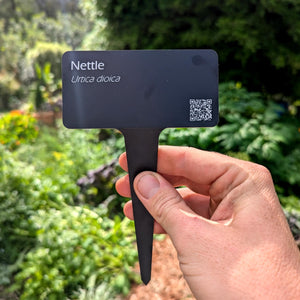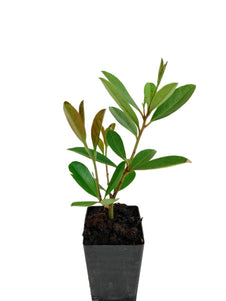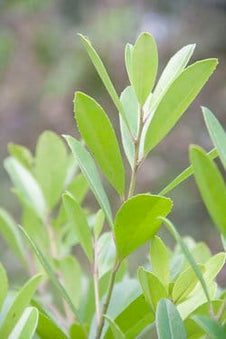



Yerba Mate
Yerba Mate

- In stock, ready to ship
- Inventory on the way

Usually available: All year
Life cycle: Perennial
Height: 3 - 10m
Position: Sun / part shade
Soil preference: Well drained
This is how we pack and send your Herb Plants to all states except TAS & WA
You will receive
- 1 Yerba Mate Herb Plant in a 50 X 75mm tube - General growing instructions
All of our Herb Plants are grown organically with certified organic potting mixes and fertilizers
Botanical Name: Ilex paraguariensis
The word yerba refers to the leaves and means ‘herb’ in Spanish, although the mate plant is not herbaceous. The yerba mate plant (pronounced ‘matay’ or ‘mateh’ depending on sources) is a shrub when young and in its natural rainforest conditions, grows into a tree of 15-20 meters. In the garden environment, it is not likely to reach that height and can be maintained as a small tree or shrub. Graceful branches hold the dark green, elongated ‘holly like’ leaves, which have a stiff, leathery appearance. The small, green/white flowers have four petals and give way to small, red fruits.
Yerba is native to the sub-tropical areas of Paraguay, Bolivia, Uraguay, Brazil and South Eastern Argentina. Yerba mate was first classified in 1895, but there are records of its use by the Guarani Indians of Paraguay in the 16th century. It was then that Spanish explorers first reported that the Guarani people, and the Tupi people in Brazil, brewed a drink resulting in an experience of ‘exhilaration and relief form fatigue’. The Spanish Conquistidors were responsible for opening the significant trade routes for yerba mate, which eventually lead to the immense commercial supply today.
Growing Conditions
Yerba mate can sometimes be difficult to grow outside its native South American conditions. One of the difficulties is the need for the seed to pass through the digestive system of Toucans. The plant is also hard to propagate because the seeds require stratification, or a cold period, and may take form 2 months up to a year to germinate. Propagation is best done by cuttings
Under natural conditions, yerba mate grows best in filtered sunlight under taller rainforest trees. Rainforests have fertile soil, enriched by continual leaf fall, microbial and insect activity. Ideally, yerba mate prefers similar rich, moist soil conditions, so the addition of organic matter will be beneficial. Yerba mate grows in sub-tropical areas where the average rainfall is extremely high and temperatures range from 15- 29 Celsius. They are often found growing naturally by streams and thrive at 500 meters above sea level.
To keep the tree manageable, you can prune the branches and maintain the plant as a taller shrub like tree. The plant is best pruned every 1-3 years to keep it at a manageable 4-8 meters. This also improves the harvest and ability to reach the new leaves.
Yerba can also be grown in pots and indoors, where weather conditions are not ideal for outdoor growing.
Culinary Uses
Yerba mate is known for its use as a stimulating, caffeine based drink in South America, where Mate bars are very popular. The mate drink holds great cultural significance and occupies the same position as coffee, throughout the rest of the world. In the Mate Bars, the drink may be served flavoured, with burnt sugar, lemon juice and milk being popular additives. Some brands combine herbs, like peppermint or add citrus, to complement the naturally bitter taste. In Brazil, the drink may be called ‘chimarao’.
There are many commercial Mate beverages and teas, some pure and others with complementary flavours. There is even an un-carbonated soft drink available. The natural flavour is described as bitter with a smoky, woody or grassy-vegetal tone. However, the commercially cultivated plants have yet to produce the higher quality flavour of wild, rainforest grown plants. Rainforest grown plants have darker, emerald coloured leaves and higher quality nutrients.
The caffeine content of yerba mate is less than coffee but more than tea, so it offers a ‘jitterfree’ caffeine boost, and antioxidants, without the side effects. The caffeine content is approximately 80mg per cup, or twice as much as tea, while coffee has 100-200mg per cup. As a comparison, guarana has significantly more caffeine than coffee.
Traditionally, the drink is brewed in steaming, hot water and served in a large, hollowed out gourd. It is sipped through a reed straw, with a filter on the end to stop leaves. The Spanish word ‘mate’ refers to the gourd. Evidence suggests that in Uraguay, the average person consumes 9-10 kilograms each year. Men also chewed the leaves on long treks, as a guard against fatigue.
A simple home style, yet traditional preparation is to make a leaf or tea infusion with 2-4 grams of leaves in 150mls of hot water.
Medicinal Uses
The leaves of yerba mate are high in many vitamins, minerals and antioxidants. The active constituents are found in the leaves and include caffeine, theobromine and theophylline. The Mate drink has been compared to green tea, with claims that it has significantly more antioxidants. However, each tea has a different group of antioxidant, with different benefits and they are not comparable. Some sources claim that yerba contains mateine, rather than caffeine. However, scientific research has confirmed the caffeine content of the yerba leaf.
The medicinal and/or health benefits are thought to include: increased energy, thermogenic (fat burning), appetite suppressant, blood cleansing, memory enhancement, digestive stimulant, pain reliever, increase bile production, mildly laxative, immunity enhancement and promotes perspiration. There have been some preliminary studies done on the benefits for fat burning, cardiovascular health and DNA repair, but further research is required for conclusive evidence.
Despite the beneficial effects there is always a risk that too much of a good thing can work in reverse. Overuse may trigger anxiety, insomnia or headaches and is best avoided by people who have heart disease, high blood pressure, existing anxiety concerns and pregnant or breastfeeding women.
There are indications that excessive consumption of the yerba mate drink may result in cancer, including oesophageal, mouth, pharynx, larynx and lungs. However, the risk is dose related and western drinkers of Mate drinks are unlikely to consume enough to raise concerns.
All information provided on this website is for informational purposes only. Please seek professional advice before commencing any treatment.






